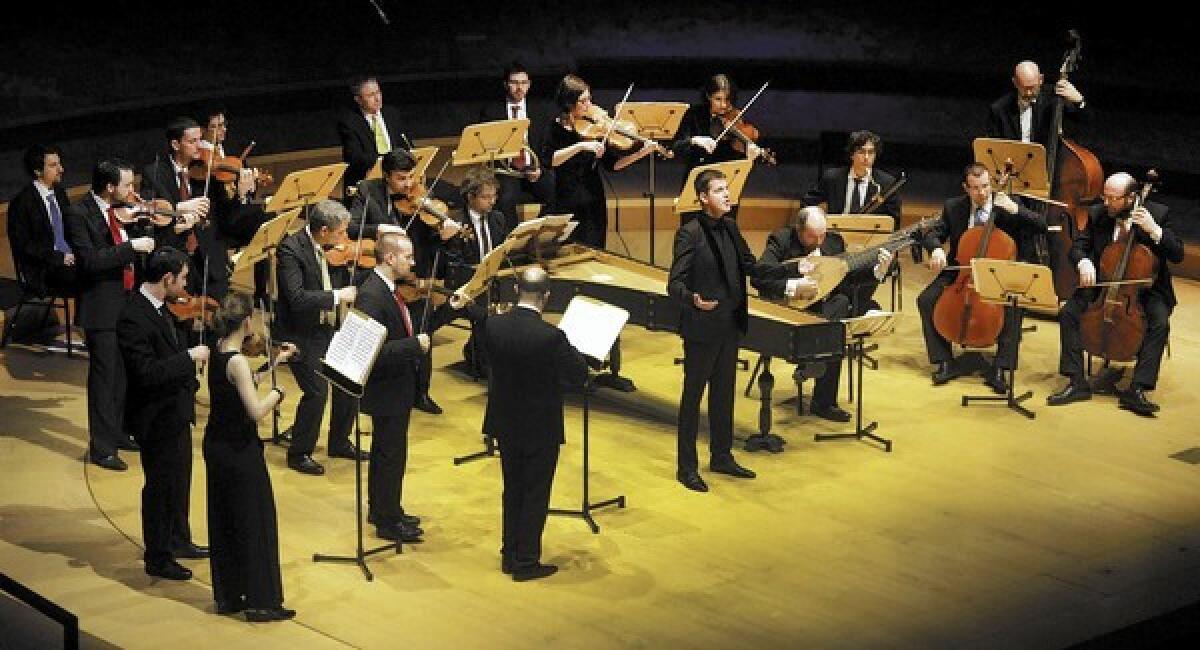Music review: Philippe Jaroussky a class act at Disney Concert Hall

- Share via
Philippe Jaroussky is one suave countertenor. Were there an early music Rat Pack, he could lead it.
Appearing with the Venice Baroque Orchestra at Walt Disney Concert Hall on Wednesday, Jaroussky, who turns 36 next week, looked the part of a Handelian Harry Connick Jr. Stylishly tuxedo-ed as if for a Las Vegas stage show of a time when class still mattered, his presence was smooth as silk. His voice is sweet as honey yet far more fluid. He left little wonder why he has become an unusually big star (for a countertenor, anyway) in his native France.
Jaroussky’s intent, in a program titled “A Legendary Battle,” was to employ considerable countertenor charms toward making the case for two competitive composers in 18th-century London. Handel needs no help today. But Nicola Porpora does.
CRITICS’ PICKS: What to watch, where to go, what to eat
Jaroussky employed his sumptuous tone, graceful phrasing and high virtuosity in elaborately ornamental runs to four arias by each composer. It was a fair fight in that Jaroussky found a highly appealing middle ground between two extremist composers.
A Neapolitan who had a peripatetic career, Porpora wrote more than 50 operas but has been remembered as the mentor of castrati, including Farinelli, the biggest sensation of his age. Not surprisingly then, Porpora’s gift was for gorgeous and extravagantly virtuosic writing for the voice, and a few modern singers, particularly Cecilia Bartoli, have lately turned to him. (She appears as a guest on Jaroussky’s new Porpora recording.)
Jaroussky has the voice for Porpora. He managed fabulously florid fireworks with astonishing ease. “Alto Giove” (Mighty Jove) from “Polifemo,” begins with seductive rising and then falling swell on a single note; Jaroussky turned that into a near decadent sonic siren call beckoning pure pleasure.
Another aria from “Polifemo” and ones from “Arianna e Teseo” and “Semiramide Riconosciuta” hearkened stormy or sugary sentiments the way Baroque operas typically did. Jaroussky does not have the big sound the castrati were said to have had. They tended to be big guys, what with their hormonal imbalances and all. They were known to be temperamental onstage and off. The refined Jaroussky always put the music first.
PHOTOS: Arts and culture in pictures by The Times
Jaroussky’s Handel was selected from “Alcina,” “Ariodante” and “Oreste.” The first two operas are among Handel’s best known, and the familiarity gave the composer a certain advantage. But there was no mistaking Handel’s emotional insight. Simply hearing Jaroussky sing a beautifully gracious account of Ariodante’s “Scherza Infida,” blending exquisitely with a solo bassoon in the orchestra, revealed the huge gap between surface and depth in Baroque music.
A different sort of battle did, however, occur onstage. Battle may be overstating it, because Jaroussky and the 20-piece period instrument ensemble Venice Baroque seemed to get along just fine. But the orchestra, which specializes in Italian music and has made many exhilarating recordings of Vivaldi, did prove a far better fit in Porpora’s world than Handel’s.
Maybe the roughness of the playing can be attributed to the fact that the group’s founder and conductor, harpsichordist Andrea Marcon, was not present. The performances were led, instead, by concertmaster Gianpiero Zanocco. Membership has changed considerably in recent years; few names found on the ensemble’s best recordings were at Disney Hall.
The concert began with a brief and insignificant Porpora overture (to “Il Germanico”) but also included two significant Handel concerti grossi (Nos. 1 and 4 from the Opus 6 set) given more spirit than finesse. Still, this is a good-natured band that proved captivating even when unreliable old horns revealed minds of their own.
As a serious composer, Handel won hands down. He always will. But the Baroque was an era that valued entertainment, and Porpora rises to the top in that regard. Jaroussky’s encore was a forgotten aria from a forgotten opera by a forgotten Italian composer, Geminiano Giacomelli. It too was lovely.
More to Read
The biggest entertainment stories
Get our big stories about Hollywood, film, television, music, arts, culture and more right in your inbox as soon as they publish.
You may occasionally receive promotional content from the Los Angeles Times.











